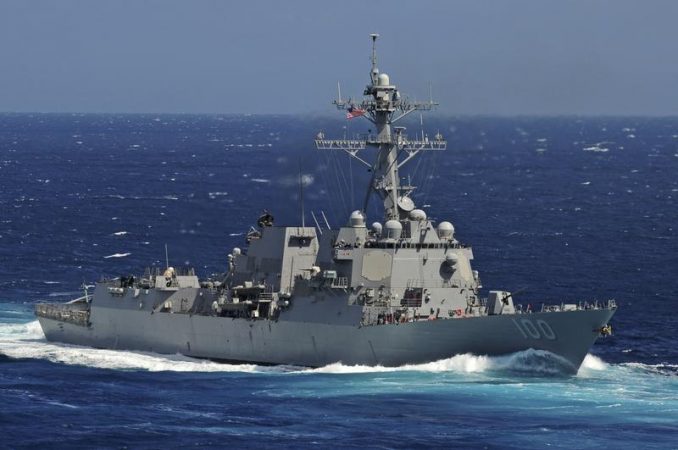
US is exploring scenarios for a potential war with China over Taiwan
(ORDO NEWS) — A group of American experts decided to simulate a hypothetical war between China and the United States over Taiwan, reports Bloomberg. In their opinion, during the conflict, the Americans and the Japanese will suffer irreparable damage. Taiwan’s infrastructure will be critically affected.
The unofficial “what if” game is being played on the fifth floor of an office building near the White House and involves a US military response to the Chinese invasion in 2026. Despite the fact that the situation is modeled from the position of the American side, it turned out that in the event of a victory, the United States and Taiwan would suffer huge losses.
“The results show that, although not in all, but in most scenarios, Taiwan can repel an invasion,” said Mark Cancian, senior adviser at the Center for Strategic and International Studies (CSIS), on the basis of which it was decided to consider options. However, this will come at a severe cost to both Taiwan’s infrastructure and economy and US forces in the Pacific.”
Retired US Navy generals and officers, former Pentagon officials and CSIS analysts will be poring over the calculations until September. They consider different scenarios as they move blue and red cubes and small wooden squares across maps of the Western Pacific and Taiwan. The results of the work are planned to be published in December.
In most scenarios, the default is China’s invasion of Taiwan to force the unification of the self-governing island, and the US decides to intervene and send the military to the island. Japan’s consent to the use of American bases located on its territory is also considered as a given, although Japan itself refrains from direct intervention, reserving such a right only in the event of an attack on its own land. Nuclear weapons are not used in the scenarios - only those that countries have already demonstrated or plan to adopt by 2026 are taken into account.
China’s recent missile test launches in response to US House Speaker Nancy Pelosi’s visit to Taiwan confirmed Beijing’s capabilities already in the scenarios.
“So far, in 18 of the 22 rounds of the game, Chinese missiles have sunk a significant portion of the US and Japanese surface fleets and destroyed hundreds of aircraft on the ground,” said Kansian, who served as an analyst at the White House and is a retired US Marine Corps colonel. Allied air and sea counterattacks will hit the unprotected Chinese amphibious and surface fleet, sinking about 150 Chinese ships.”
“The reason for the high losses of the US is that they cannot conduct a rationally organized campaign to destroy the Chinese defenses before they come close. The United States must send forces to attack the Chinese fleet, especially landing ships, before establishing air or sea superiority, he said, “To get an idea of the extent of the losses, in the last scenario played out, the United States lost more than 900 fighters in four weeks. That’s about half the arsenal of the Navy and Air Force.”
The Chinese missile forces have a destructive power, and therefore a special role in the conflict should be played by American submarines and bombers with long-range missiles. “For the Taiwanese, anti-ship missiles are most important, and to a lesser extent, warships and aircraft. Ships will have a hard time as long as the Chinese have long-range missiles,” Keynesian said.
The participants in the war game have not yet calculated the number of victims or the massive economic consequences of the conflict between the United States and China, the world’s two largest economies.
Taiwan’s defense capability is a particularly important part of the calculation, because its forces will be busy holding back Chinese troops landing from the south, as the scenario suggests.
“Success or failure of the ground war depends entirely on the Taiwanese forces,” Keynesian said. “So far, in all iterations, the Chinese have been able to establish a beachhead, but they have not been able to expand it in most cases. In several cases, the Chinese managed to keep part of the island under control, but not the whole.”
American-made Harpoon anti-ship missiles and domestically produced weapons will play a significant role in the operational destruction of Chinese landing forces, although the navy and half of Taiwan’s air force will most likely be destroyed in the very first days of the conflict.
“Taiwan is a big island, and the army is not small,” said Eric Heginbotham, chief scientist at the Center for International Studies at the Massachusetts Institute of Technology in Cambridge, Massachusetts. should be, and we took this into account in the simulations. The recruitment of the army personnel exclusively by salaried employees has failed, and conscripts serve only four months, although they remain an important element.”
More disconcerting than other findings in Washington, none of the high-cost operations modeled so far have been out of the ordinary.
“We have not yet considered the most pessimistic scenarios in which China could conquer the entire island,” Keynesian said. In the four remaining rounds, analysts will also consider a number of alternative scenarios, including a delay in the transit of US troops, a strict neutrality of Japan, and China gaining many advantages, he said.
David Ochmanek, Senior Defense Scientist at Rand Corporation and former Deputy Assistant Secretary of Defense, said the Center for Strategic and International Studies simulations, in which he also participated, were well organized and adequately constructed. Ochmanek had been involved in more than a dozen Sino-American war games before, both secret and not, and this time the conclusions were, he said, almost identical to those drawn earlier.
The key to “any good game lies in knowledgeable players who can conscientiously and creatively mimic the actions of their country’s armed forces, as well as judges - essentially arbitrators - who can reliably evaluate the results of clashes and battles,” Ochmanek said.
Governments and third parties around the world are playing war games. But the instructions for the CSIS project participants say that although the Pentagon has already played many such war games, they are all classified. As a result, there is very little information available to the public. The current project is designed to fill this gap and encourage the public to discuss the organizational structure and overall course of the US military.
—
Online:
Contact us: [email protected]
Our Standards, Terms of Use: Standard Terms And Conditions.






